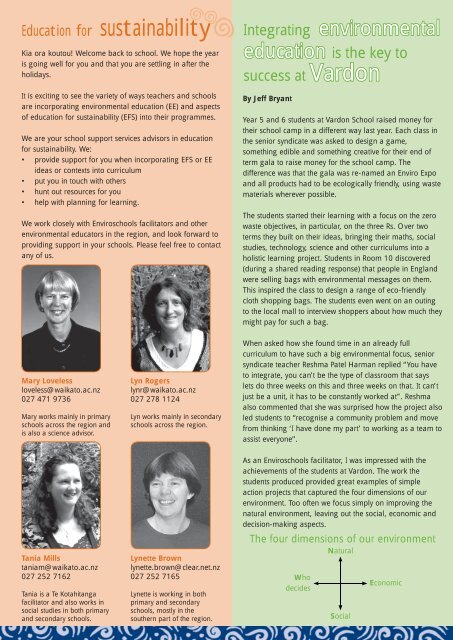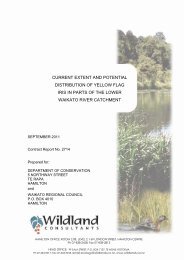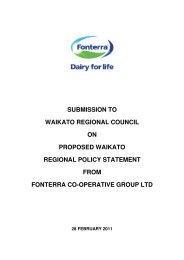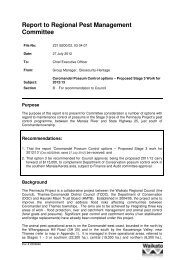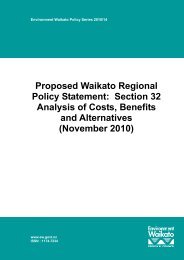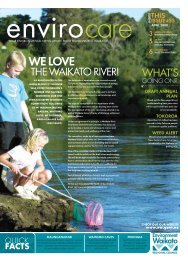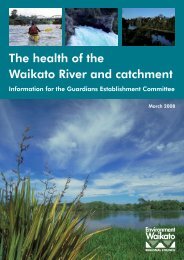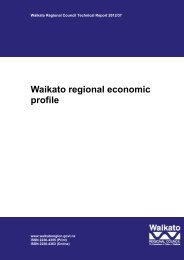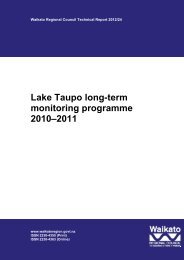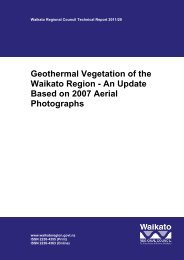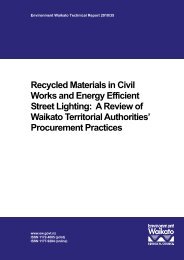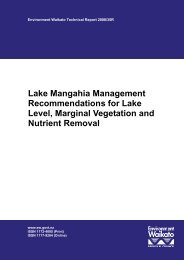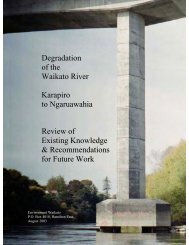Enviroschools Newsletter no. 11 - May 2007 - Waikato Regional ...
Enviroschools Newsletter no. 11 - May 2007 - Waikato Regional ...
Enviroschools Newsletter no. 11 - May 2007 - Waikato Regional ...
Create successful ePaper yourself
Turn your PDF publications into a flip-book with our unique Google optimized e-Paper software.
Education for sustainability<br />
Kia ora koutou! Welcome back to school. We hope the year<br />
is going well for you and that you are settling in after the<br />
holidays.<br />
It is exciting to see the variety of ways teachers and schools<br />
are incorporating environmental education (EE) and aspects<br />
of education for sustainability (EFS) into their programmes.<br />
We are your school support services advisors in education<br />
for sustainability. We:<br />
• provide support for you when incorporating EFS or EE<br />
ideas or contexts into curriculum<br />
• put you in touch with others<br />
• hunt out resources for you<br />
• help with planning for learning.<br />
We work closely with <strong>Enviroschools</strong> facilitators and other<br />
environmental educators in the region, and look forward to<br />
providing support in your schools. Please feel free to contact<br />
any of us.<br />
Integrating environmental<br />
education is the key to<br />
success at Vardon<br />
By Jeff Bryant<br />
Year 5 and 6 students at Vardon School raised money for<br />
their school camp in a different way last year. Each class in<br />
the senior syndicate was asked to design a game,<br />
something edible and something creative for their end of<br />
term gala to raise money for the school camp. The<br />
difference was that the gala was re-named an Enviro Expo<br />
and all products had to be ecologically friendly, using waste<br />
materials wherever possible.<br />
The students started their learning with a focus on the zero<br />
waste objectives, in particular, on the three Rs. Over two<br />
terms they built on their ideas, bringing their maths, social<br />
studies, tech<strong>no</strong>logy, science and other curriculums into a<br />
holistic learning project. Students in Room 10 discovered<br />
(during a shared reading response) that people in England<br />
were selling bags with environmental messages on them.<br />
This inspired the class to design a range of eco-friendly<br />
cloth shopping bags. The students even went on an outing<br />
to the local mall to interview shoppers about how much they<br />
might pay for such a bag.<br />
Mary Loveless<br />
loveless@waikato.ac.nz<br />
027 471 9736<br />
Mary works mainly in primary<br />
schools across the region and<br />
is also a science advisor.<br />
Lyn Rogers<br />
lynr@waikato.ac.nz<br />
027 278 <strong>11</strong>24<br />
Lyn works mainly in secondary<br />
schools across the region.<br />
When asked how she found time in an already full<br />
curriculum to have such a big environmental focus, senior<br />
syndicate teacher Reshma Patel Harman replied “You have<br />
to integrate, you can’t be the type of classroom that says<br />
lets do three weeks on this and three weeks on that. It can’t<br />
just be a unit, it has to be constantly worked at”. Reshma<br />
also commented that she was surprised how the project also<br />
led students to “recognise a community problem and move<br />
from thinking ‘I have done my part’ to working as a team to<br />
assist everyone”.<br />
Tania Mills<br />
taniam@waikato.ac.nz<br />
027 252 7162<br />
Tania is a Te Kotahitanga<br />
facilitator and also works in<br />
social studies in both primary<br />
and secondary schools.<br />
Lynette Brown<br />
lynette.brown@clear.net.nz<br />
027 252 7165<br />
Lynette is working in both<br />
primary and secondary<br />
schools, mostly in the<br />
southern part of the region.<br />
As an <strong>Enviroschools</strong> facilitator, I was impressed with the<br />
achievements of the students at Vardon. The work the<br />
students produced provided great examples of simple<br />
action projects that captured the four dimensions of our<br />
environment. Too often we focus simply on improving the<br />
natural environment, leaving out the social, eco<strong>no</strong>mic and<br />
decision-making aspects.<br />
The four dimensions of our environment<br />
Natural<br />
Who<br />
decides<br />
Social<br />
Eco<strong>no</strong>mic


